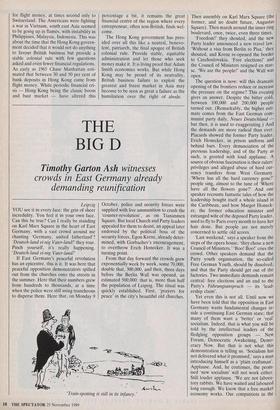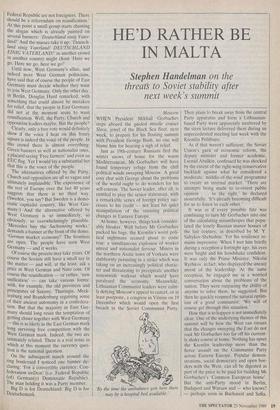THE BIG D
Timothy Garton Ash witnesses
crowds in East Germany already demanding reunification
Leipzig YOU see it in every face: the grin of sheer incredulity. You feel it in your own face. Can this be true? Can I really be standing on Karl Marx Square in the heart of East Germany, with a vast crowd around me chanting `Germany, united fatherland'? Deutsch-land ei-nig Vater-land!' they roar. Pinch yourself, it's really happening. `Deutsch-land ei-nig Vater-land!'
If East Germany's peaceful revolution has an epicentre, this is it. It was here that peaceful opposition demonstrators spilled out from the churches onto the streets in the summer. Here that their numbers grew from hundreds to thousands, at a time when the police were still using truncheons to disperse them. Here that, on Monday 9 October, police and security forces were supplied with live ammunition to crush the `counter-revolution', as on Tiananmen Square. But local Church and Party leaders appealed for them to desist, an appeal later endorsed by the political boss of the security forces, Egon Krenz, already deter- mined, with Gorbachev's encouragement, to overthrow Erich Honecker. It was a turning point.
From that day forward the crowds grew exponentially week by week, some 70,000, double that, 300,000, and then, three days before the Berlin Wall was opened, an estimated 500,000: that is, more than half the population of Leipzig. The ritual was quickly established. First, `prayers for peace' in the city's beautiful old churches.
Train-spotting is still in its infancy.' Then assembly on Karl Marx Square (the former, and no doubt future, Augustus Square). Then march around the inner ring boulevard, once, twice, even three times.
`Freedom!' they shouted, and the new Party leader announced a new travel law. `Without a visa from Berlin to Pisa,' they shouted, and Krenz re-opened the border to Czechoslovakia. `Free elections!' and the Council of Ministers resigned en mas- se. 'We are the people!' and the Wall was open.
The question is now: will this dramatic opening of the frontiers reduce or increase the pressure on the regime? This evening gives an answer. Despite the bitter cold, between 100,000 and 200,000 people turned out. (Remarkably, the higher esti- mate comes from the East German com- munist party daily, Neues Deutschland — but then, it is used to exaggerating.) And the demands are more radical than ever. Placards showed the former Party leader, Erich Honecker, in prison uniform and behind bars. Every denunciation of the previous leadership, and of the Party as such, is greeted with loud applause. A source of obvious fascination is their rulers' privileges and alleged abuse of hard cur- rency transfers from West Germany. `Where has all the hard currency gone?' people sing, almost to the tune of 'Where have all the flowers gone?' And one speaker recounts fantastic tales of how the leadership bought itself a whole island in the Caribbean, and how Margot Honeck- er, the former education minister and estranged wife of the deposed Party leader, used to fly to Paris every month to have her hair done. But people are not merely concerned to settle old scores.
`Last weekend,' says a speaker from the steps of the opera house, 'they chose a new Council of Ministers."Boo! Boo!' cries the crowd. Other speakers demand that the Party youth organisation, the so-called Free German Youth, should be dissolved, and that the Party should get out of the factories. Two immediate demands remain central: free elections and an end to the Party's Fiihrungsanspruch — its 'lead- ership claim'.
Yet even this is not all. Until now we have been told that the opposition in East Germany wants fundamental changes in- side a continuing East German state; that many of them want a `better' or 'real' socialism. Indeed, that is what you will be told by the intellectual leaders of the fledgling opposition groups — New Forum, Democratic Awakening, Demo- cracy Now. But that is not what this demonstration is telling us. `Socialism has not delivered what it promised,' says a man introducing himself as a `plain craftsman'. Applause. And, he continues, the prom- ised `new socialism' will not work either. Still louder applause. 'We are not labora- tory rabbits. We have waited and laboured long enough. We know that a free market economy works. Our compatriots in the Federal Republic are not foreigners. There. should be a referendum on reunification.' At this point a small group starts chanting the slogan which is already painted on several banners: 'Deutschland einig Vater- land!' And the masses take it up: 'Deutsch- land einig Vaterland! DEUTSCHLAND EINIG VATERLAND!' as another crowd in another country might chant 'Here we go. Here we go, here we go!'
Until now, West Germany's allies, and indeed most West German politicians, have said that of course the people of East Germany must decide whether they want to join West Germany. Only the other day, in Berlin, Douglas Hurd remarked, with something that could almost be mistaken for relief, that the people in East Germany did not at the moment seem to want reunification. Well, the Party, Church and opposition leaders maybe. But the people? Clearly, only a free vote would definitely show if the voice I hear on this frosty square is indeed the voice of the people. In this crowd there is almost everything: Green banners as well as nationalist ones, a placard saying 'Free farmers' and even an EEC flag. Yet I would lay a substantial bet that this is the voice of the people.
The alternatives offered by the Party, Church and opposition are all so vague and ultimately implausible. The experience of the rest of Europe over the last 40 years suggests that there is no third way. (Sweden, you say? But Sweden is a demo- cratic capitalist country, like West Ger- many.) And the alternative offered by West Germany is so immediately, so obviously, so overwhelmingly plausible. 'Mercedes buy the Sachsenring works,' demands a banner at the front of the demo. 'German market economy!' The frontiers are open. The people have seen West Germany — and it works.
Of course the process may take years. Of course the Soviets still have a small say in the matter — and will, at the least, ask a price in West German and Nato coin. Of course the reunification — or rather, 'new unification' — can take various forms: With, for example, the old provinces and principates of Saxony, Thuringia, Meck- lenburg and Brandenburg regaining some of their ancient autonomy in a confedera- tion. But that the majority in East Ger- many should long resist the temptation of getting closer together with West Germany — this is as likely as the East German mark long surviving free competition with the West German mark. Indeed, the two are intimately related. There is a real sense in which at this moment the currency ques- tion is the national question.
On the subsequent march around the ring boulevard I noticed one banner de- claring: 'For a convertible currency. Con- federation BRDUR' (i.e. Federal Republic (of) German(y) Democratic Republic). The man holding it was a Party member.
Big D is for Deutschland. Big D is for Deutschemark.











































































 Previous page
Previous page